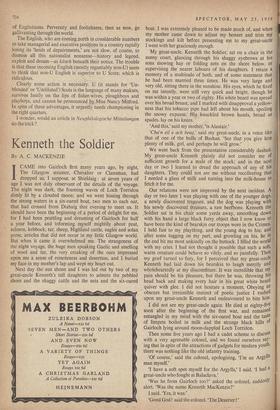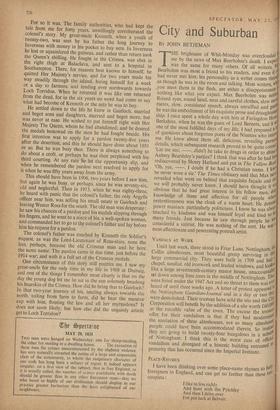Kenneth the Soldier
By A. C. MACKENZIE ICAME into Gairloch first many years ago, by night. The Glasgow steamer, Chevalier or Clansman, had dropped us, I suppose, at Shieldaig : at seven years of age I was not duly observant of the details of the voyage. The night was dark, the foaming waves of Loch Torridon dimly lit by a clouded moon; and we went hissing through the strong waters in a six-oared boat, two men to each oar, that had crossed from Diabaig that evening to meet us. It should have been the beginning of .a period of delight for me, for I had been prattling and dreaming of Gairloch for half a year before, and informing myself mightily about peat, salmon, kebbock, tar, sheep, Highland cattle, eagles and solan geese, articles that did not occur in my little Glasgow world. But when it came it overwhelmed me. The strangeness of the night voyage, the huge men speaking Gaelic and smelling of wool and tar, the very creaking of the oars impressed upon me a sense of remoteness and desertion, and I buried my face in my mother's lap and wept my heart out.
Next day the sun shone and I was led out by two of my great-uncle Kenneth's tall daughters to admire the pebbled shore and the shaggy cattle and the nets and the six-oared boat. I was extremely pleased to be made much of, and when my mother came down to adjust my bonnet and trim my stockings and kilt before presenting me to my great-uncle I went with her graciously enough.
My great-uncle, Kenneth the Soldier, sat on a chair in the sunny court, glancing through his shaggy eyebrows at his sons mowing hay or folding nets on the shore below, or supervising the nearer labours of his daughters. I retain a memory of a multitude of both, and of some statement that he had been married three times. He was very large and very old, sitting there in the sunshine. His eyes, which he fixed on me intently, were still very quick and bright, though he was within a year or two of eighty. His white beard was spread over his broad breast, and I marked with disapproval a yellow. ness that his tobacco pipe had left about his mouth, spoiling the snowy expanse. His knuckled brown hands, broad as spades. lay on his knees.
'And this,' said my mother, 'is Alastair.'
rhu'n eil e ach beng: said my great-uncle, in a voice like that of one of the bulls of Bashan. 'See that you give hill plenty of milk, girl, and perhaps he will grow.'
We went back from the presentation considerably dashed. My great-uncle Kenneth plainly did not consider me of sufficient growth for a male of the stock; and in the next day or two I learned to dread the approach of any of his daughters. They could not see me without recollecting that I needed a glass of milk and turning into the milk-house to fetch it for me.
Our relations were not improved by the next incident. A day or two later I was playing with one of the younger dogs, a newly discovered treasure, and the dog was playing with his newly discovered treasure, a raw beefbone. Kenneth the Soldier sat in his chair some yards away, smoothing down with his hand a large black furry object that I now know to have been the kind of bearskin our troops wore in the Crimea. I held fast to my plaything, and the young dog to his; and after some tugging on my part, and growling on his, he in the end bit me most unkindly on the buttock. I filled the world with my cries. I had not thought it possible that such a soft, warm creature could behave so vilely, and so painfully. Then my grief turned to fury, for I perceived that my great-uncle Kenneth had laid down his bearskin to laugh merrily and wholeheartedly at my discomfiture. It was incredible that 111Y pain should be his pleasure, but there he was, throwing his head back and making every hair in his great white beard quiver with glee. I did not hesitate a moment. Obeying an obscure but irresistible instinct of poetic justice I rushed upon my great-uncle Kenneth and endeavoured to bite him.
I did not see my great-uncle again. He died at eighty-five soon after the beginning of the first war, and remained entangled in my mind with the six-oared boat and the taste of limpets boiled in milk and the strange black hills of Gairloch lying around moon-dappled Loch Torridon.
Then some five years ago I had a cadet scheme to discuss with a very agreeable colonel, and we found ourselves saY' ing that in spite of the attractions of gadgets for modern youth' there was nothing like the old infantry training. 'Of course,' said the colonel, apologising, 'I'm an ArgYlls man myself.'
'I have a soft spot myself for the Argylls,' I said. 'I had a great-uncle who fought at Balaclava.' 'Was he from Gairloch too?' asked the colonel, sudderdY alert. 'Was the name Kenneth MacKenzie?'
I said, 'Yes, it was.'
'Good God ! said the colonel. 'The Deserter!' For so it was. The family authorities, who had kept the tale from me for forty years, unwillingly corroborated the colonel's story. My great-uncle Kenneth. when a youth of twenty-two, was sent by his father the Iota; journey to Inverness with money in his pocket to buy nets. In Inverness he lost or squandered the guineas, and rather than return took the Queen's shilling. He fought in the Crimea, was shot in the right thigh at Balaclava, and sent to a hospital in Southampton. There, for reasons best known to himself, he quitted Her Majesty's service, and for two years made his way steadily through the island, hiring himself for a week or a day to farmers, and tending sever northwards towards Loch Torridon. When he returned it was like one returned from the dead, for in the six years no word had come to say what had become of Kenneth or the nets he was to buy.
He settled down to the life he knew in Gairloch, married and begot sons and daughters, married and begot more, but was never at ease. He wished to put himself right with Her Majesty The Queen, whom he had abandoned; and he desired the medals bestowed on the men he had fought beside. His first intention was to apply for a pardon twenty-five years after the desertion, and this he should have done about 1881 or so. But he was busy then. There is always something to do about a croft, or perhaps he was then perplexed with his third courting. At any rate he let the opportunity slip, and when he remembered the pardon next resolved to apply for it when he was fifty years away from the army.
This should have been in 1906, two years before I saw him, but again he was busy, or perhaps, since he was seventy-six, old and neglectful. Then in 1913, when he was eighty-three, he heard with panic that the colonel's father, the only Argylls officer near him, was selling his small estate in Gairloch and leaving Wester Ross for the south. The old man was desperate: he saw his chances of a pardon and his medals slipping through his fingers, and he went to a niece of his, a well-spoken woman, and commanded her to go to the colonel's father and lay before him his request for a pardon.
The colonel's father was touched by Kenneth the Soldier's request, as was the Lord-Lieutenant of Ross-shire, none the less, perhaps, because the old Crimean man and he bore the same name. The pardon came in due time. just before the 1914 war; and with it a full set of the Crimean medals.
One circumstance of this story still puzzles me. I saw my great-uncle for the only time in my life in 1908 at Diabaig, and one of the things I remember most clearly is that on the day the young dog bit me he sat in the sun solemnly brushing his bearskin of the Crimea. How did he bring that to Gairloch? In that two-year journey of his, tending always towards the north. toiling from farm to farm, did he bear the massive cap with him, flouting the law and all her myrmidons? It does not seem likely; but how else did the ungainly article get to Loch Torridon?











































 Previous page
Previous page